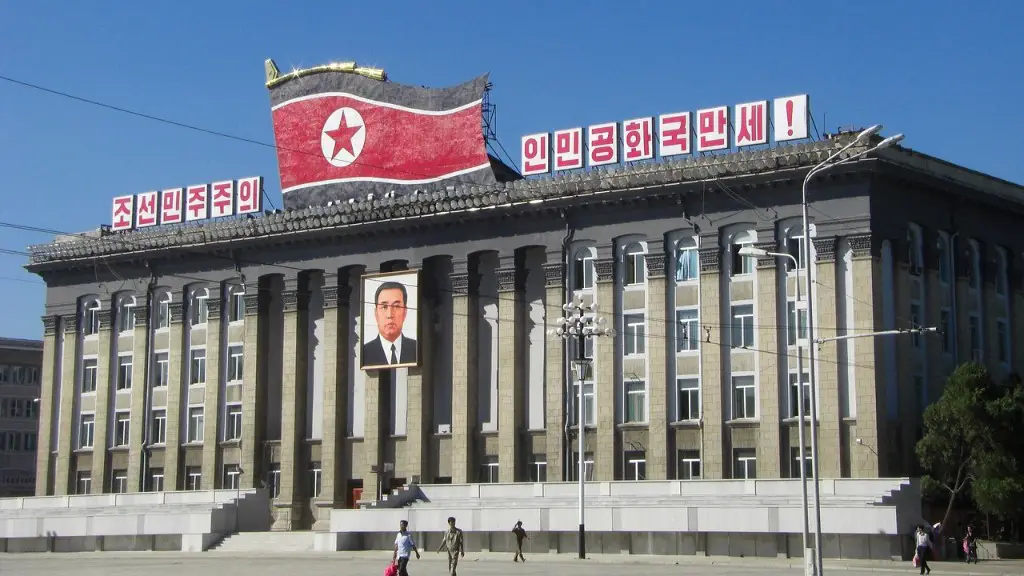Why Does US Hate North Korea?
It might be surprising to many that the United States still maintains an unfriendly relationship with North Korea. Although we may never understand all the reasons why the US hates North Korea, it’s important to understand the backstory and why it has persisted for so many years.
For more than 70 years, the United States and North Korea have had a contentious and adversarial relationship. The origins of this relationship date back to the start of the Korean War in 1950, when the United Nations backed South Korea against the Soviet-backed North Koreans. The U.S. provided military assistance to the South Korean forces, which eventually repelled the North. More than three years later, an armistice was declared and a boundary was drawn between the two sides, resulting in the physical division of the peninsula we see today.
Since then, North Korea has been a totalitarian state, where citizens are subject to extreme repression and where the leader has absolute power. The country’s foreign policy has been marked by frequent provocations and provocations towards the US, including nuclear threats, missile tests and military hostility. North Korea has continued to isolate itself from the rest of the world and its economy remains largely stagnant and impoverished.
In addition to its governance, North Korea has been accused of violating a variety of international laws, including human rights and economic sanctions imposed by the United Nations. The US has also condemned North Korea for its ballistic missile and nuclear programs, which have been a source of grave concern for world leaders. The US is particularly concerned about a possible nuclear attack against US allies in the region, possibly South Korea and Japan. These provocations have led to increased tension between the US and North Korea, and have resulted in various sanctions and trade embargoes being imposed against the country.
It is clear why the US pursues an unfriendly relationship with North Korea. North Korea’s blatant disregard for human rights and international law, its nuclear capabilities, and its hostile foreign policy all represent a major threat to international peace and security. The US will likely continue to oppose any attempts by North Korea to develop nuclear weapons and ballistic missiles, and will work to ensure that the country does not pose a threat to its allies in the region.
Economic Reasons
In addition to security reasons, there are economic reasons why the US hates North Korea. North Korea is one of the poorest countries in the world, with little access to foreign aid, investments or markets. Additionally, the North Korean government operates an oppressive, centrally planned economy, where business owners and citizens alike are subject to high levels of bureaucratic control, restrictive regulations and limited economic freedom. North Korea has also been accused of exploiting its citizens through forced labor and harsh labor camp conditions. For these reasons, the US has sought to impose economic sanctions on North Korea in order to punish the regime and to deprive them of the financial resources they need to threaten the world.
Further, US companies are not allowed to do business in North Korea and US citizens are prohibited from dealing with North Korean entities. This has led to a very limited trade relationship between the two countries, and has further isolated the North Korean economy. These economic restrictions have been a major source of tension between the US and North Korea, and have been seen as a contributing factor to the country’s economic woes.
Human Rights Abuses
In addition to economic and security issues, the US is deeply concerned about the human rights abuses taking place in North Korea. The North Korean government has long been accused of violating its citizens’ rights, including their right to free speech and to practice their own religion. The regime has been accused of severe repression, arbitrary detention and torture of its own citizens, as well as restricting their access to basic necessities such as food, medical care and education.
These draconian measures have been condemned by human rights organizations and governments around the world, including the US. As a result, the US has sought to impose additional sanctions on North Korea in an effort to punish the regime and to encourage it to respect the rights of its citizens.
Military Agression
Finally, the US is particularly concerned about North Korea’s military aggression towards its neighbors. North Korea has been accused of deploying troops along the border with South Korea, engaging in hostile acts against its adversaries, and launching various military exercises. Further, North Korea has been accused of using nuclear weapons and missiles to threaten its neighbors, including South Korea and Japan. The US views these actions as provocative, and has sought to impose additional sanctions on North Korea in order to deter further provocations.
The US also maintains a significant military presence in South Korea, and regularly conducts military exercises with the country’s armed forces. These exercises serve as a deterrent to North Korean aggression, and demonstrate the US’s commitment to its allies’ security.
International Pressure
The US has sought to leverage its influence in the international community to apply pressure on North Korea. It has sought to coordinate with its allies and to get other countries to join in the sanctions regime. This has proven to be somewhat effective in deterring North Korea and in increasing the diplomatic and economic pressure on the regime.
The US has also worked to isolate North Korea diplomatically. The US has refused to engage in negotiations with the North Korean government, and has instead sought to encourage other countries to do the same. This has further isolated the North Korean regime and reduced its international standing.
Sanctions and Embargos
The US has sought to impose economic sanctions and embargoes on North Korea in order to deprive the regime of the financial resources it needs to threaten its neighbors and the world. These sanctions have targeted key sectors of the North Korean economy, including its industries, financial institutions and foreign trade partners. This has reduced North Korea’s access to foreign markets, investments and foreign aid.
In addition to economic sanctions, the US has sought to impose additional sanctions in order to further punish the regime and to hamper its efforts to develop nuclear weapons and missiles. These sanctions have been focused on North Korean individuals and entities, and have been aimed at further isolating the regime.
Cultural Differences
Finally, the US also has strong cultural differences with North Korea. The US is a vibrant democracy and a beacon of freedom, while North Korea is a totalitarian state where citizens have few individual liberties and where the government has absolute power. The US is thus deeply concerned about the oppressive nature of the North Korean regime and its disregard for the rights of its citizens.
Given the lack of cultural connections and the stark differences between the two countries, it is no surprise that the US has so much animosity towards North Korea. The US will likely continue to pursue an unfriendly relationship with North Korea, and will continue to utilize economic sanctions and embargoes in order to deter the regime from threatening its neighbors and the world.




